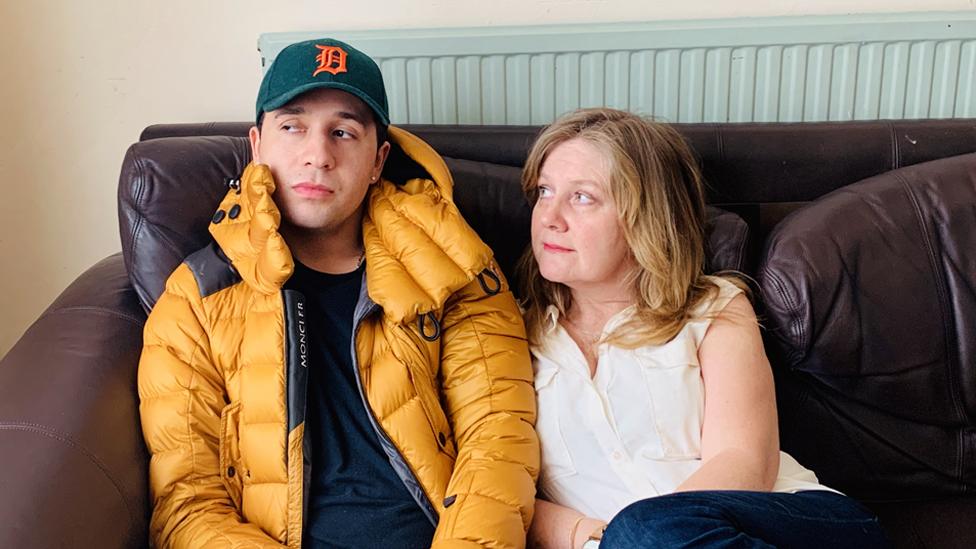Coronavirus: Talking to yourself in lockdown? You're not alone
- Published
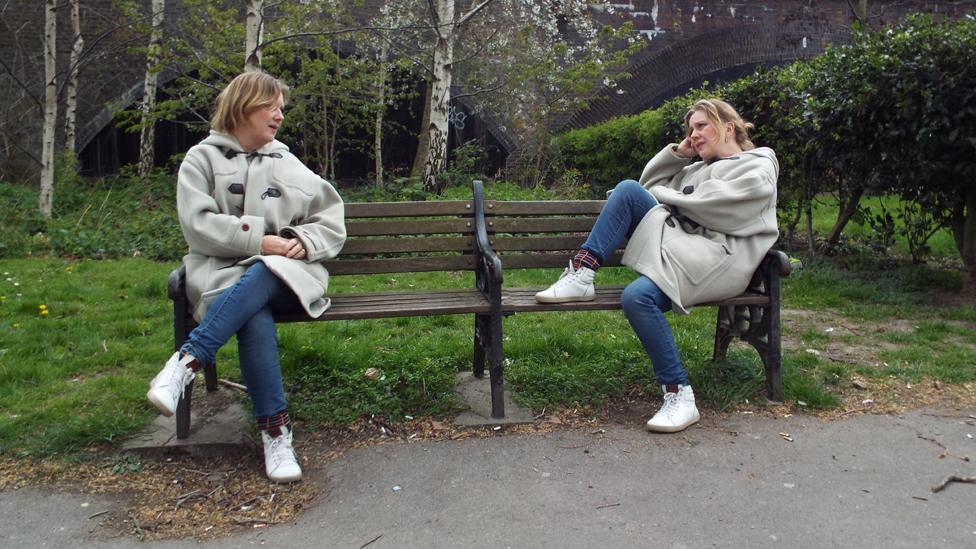
Since the lockdown, many people have been spending more time on their own. Should they be worried if they end up chatting to the only person in the room? Sue Elliott-Nicholls thinks not.
"I'm starting to talk to myself," lamented a friend who lives on her own.
"What, you mean you don't already?" I asked her. "Who do you discuss your problems with, work out who's coming for Christmas, decide whether your bum looks big in those jeans?"
Maybe it's because I work a fair bit at home, but I love a good chat with myself. Only lately I've found myself doing it out of doors, when I go for my socially-distanced shop.
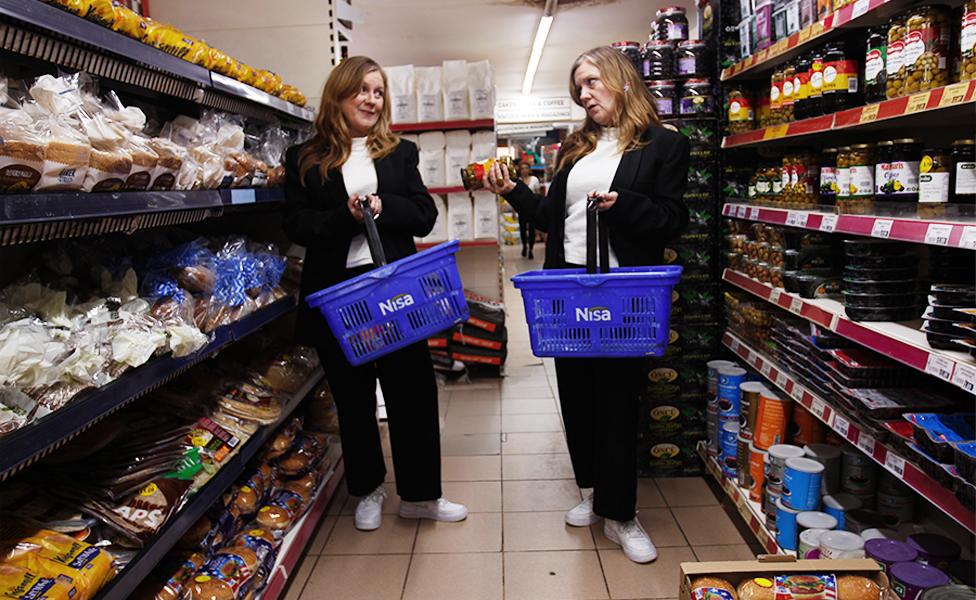
My conversations are fairly mundane, boring even.
Me: "Do you think we need more bananas?"
Me again: "Well it wouldn't hurt, someone'll eat them."
Also me: "True, bananas never last long with our lot."
Me: "But then they'll just get eaten for the sake of it. We're on a budget don't forget."
Me back: "Good point, shall we leave them then?"
Me (decisively): "Yep, let's leave them."
I don't say all of it out loud. Most of it is in my head, but some bits slip out, in a sort of unhinged mutter - until I realise what I'm doing and look sharply around to check no-one heard. Then I cover it up with a low tuneful hum, hoping it looks like that's what I was doing the whole time.
I hear my husband sometimes, muttering downstairs. I don't listen in, it's private. (Plus he may very likely be moaning about me.)
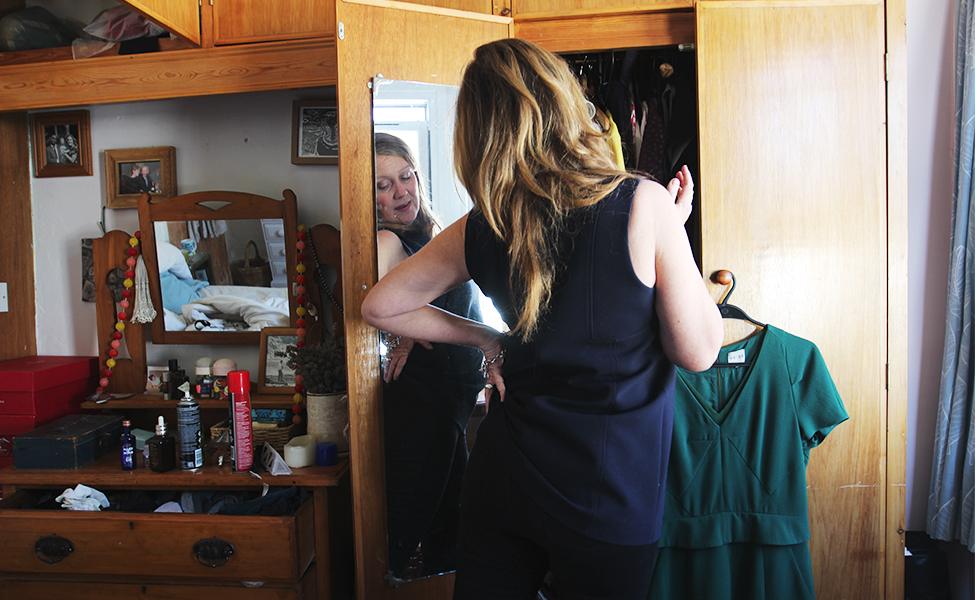
Sue helps herself decide what to wear
My old mum used to say that the best thing about talking to yourself was that you knew you would get a decent answer. But then she also said it was the first sign of madness.
Is it? I would beg to differ. I often think my little chats to myself help preserve my sanity.

Before the coronavirus lockdown Georgia Maskery didn't talk to herself, but now she's becoming her own motivational speaker, giving herself pep talks.
"I always start with 'Georgia', because then it's like someone else is talking to me," she says.
"I have to motivate myself to do everything, I have to motivate myself to put pants on in the morning! Although this morning, I was going to go for a run, but I actually talked myself out of it. 'Right, Georgia, are you gonna go?' I began. Then I'm like, 'Yeah yeah, I'm gonna go,' though by this time I was already buttering my bagel."
Then it went like this, she told me:
Look Georgia... are you going to go?
Yes.
Are you sure?
No, no, I'm not sure, because actually what I think I'm gonna do is have breakfast first, because it's meant to be sunnier at lunch time.
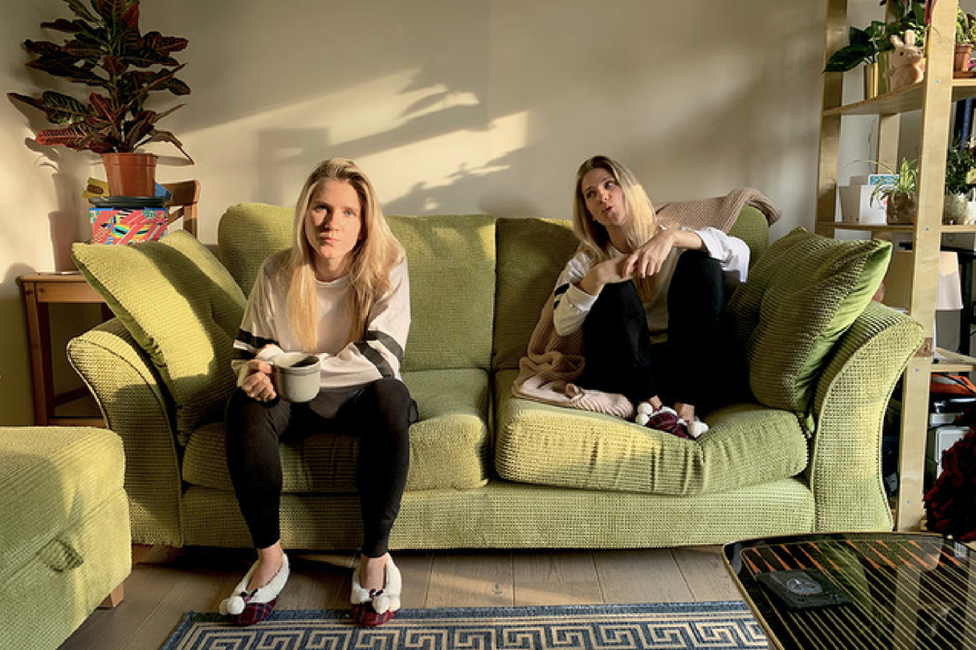
Georgia has a word with herself
This doesn't sound like a "sign of madness" to me, this sounds like a very healthy coping strategy.
"I think also it makes you feel like you've got a crowded house, when it's not, it's just the voices in your head," says Georgia. "It has actually become the new normal, which is really crazy. I miss my mates, I can talk to them on Zoom but I miss talking in real life so I've become my own mate."
Welcome to my world Georgia, it's a wonderful place. Isn't it, Sue?
When I'm working on my own, I become like my own work colleague - we're partners really. Sue is invaluable when we're at work together: we bang out ideas, discuss how to word difficult emails, sometimes we have a little gossip at the water cooler (kitchen sink), and it's nice because she comes out with me later, even helps me decide what to wear. God, I love Sue.
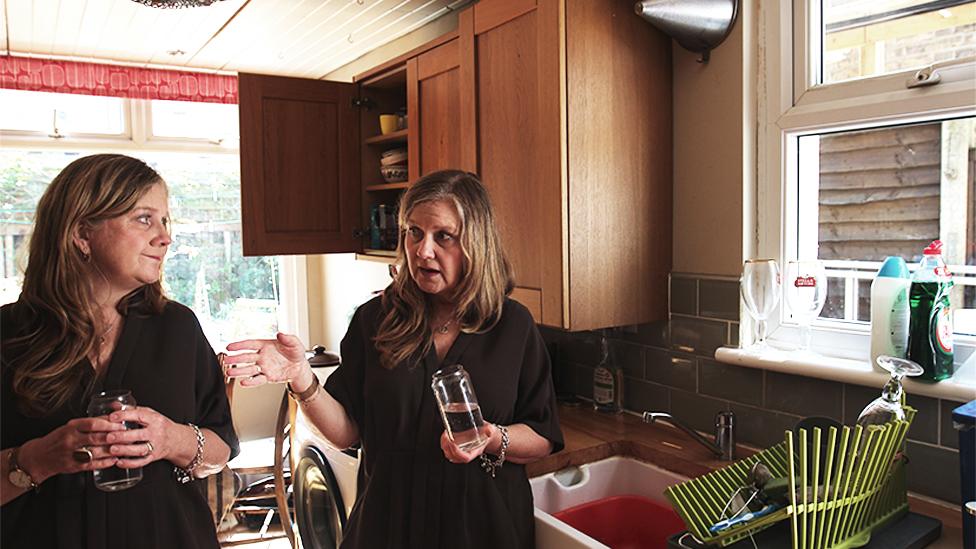
Frankie has become her own new best friend. Before the lockdown, she only used to talk to herself if she was upset, or making stupid decisions.
"I think it's like my guardian angel when it comes to boys," Frankie says. "If he's not behaving in the best way, I'll be in the toilet, saying: 'Oh come on mate, you know he's no good!'"
But talking to yourself in these situations is kind of accepted isn't it? They do it in movies, cute and kooky (but sane) characters do it. It's when you start muttering to yourself about daily goings on that it feels a little weirder.
And since social isolation Frankie, starved of her friends and her job, has started doing this when she puts her make-up on in the morning. "I'll just put a bit of brown here, this is my mascara, and then I line my lips with this lipliner, I'm going to put these little two dots here and here, and then I smudge it, here and here," she'll mutter.
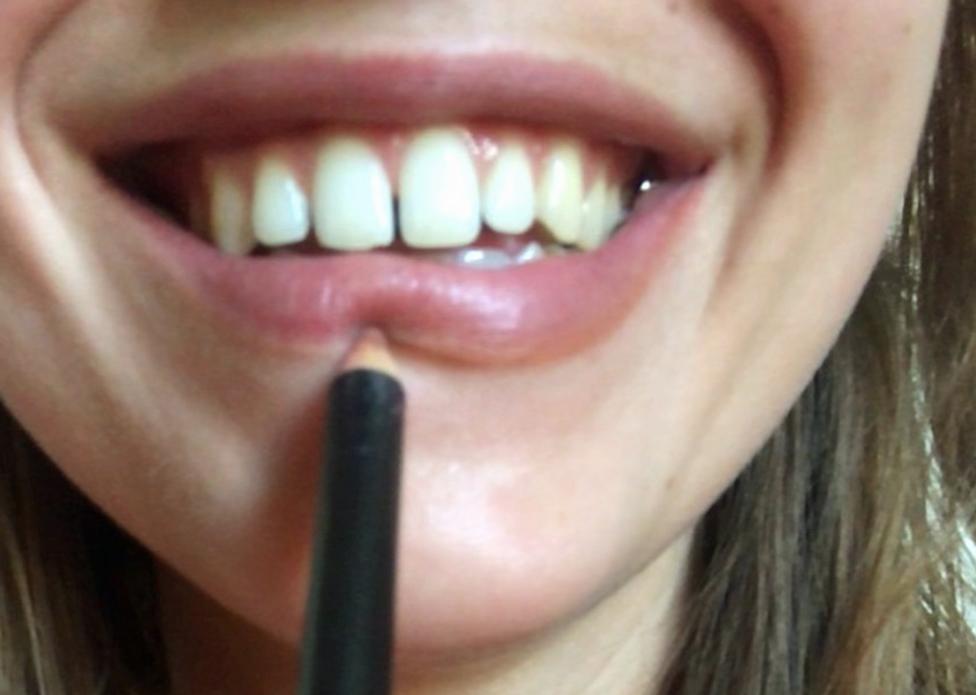
"And then I'm like - 'WHAT AM I DOING?' You don't realise you're doing it, and I guess the more you get into the habit, the harder it is to break."
Frankie's worried about turning into her mum, who talks to herself, too.
"I can see her zoning out and then she starts talking," she says. "I realise that is what awaits me."

As the lockdown has dragged on, Georgia has also started to get on her own nerves.
"I don't like my pep talks sometimes," she says.
So, of course, she talks to herself about it.
"No actually, you're being annoying, because I want to wallow lazily and now you're making me feel like I'm not doing well enough," she tells herself.
Georgia is sitting with her hand to her head and her eyes scrunched up as she tells me this on FaceTime, cringing at herself.
"Before, when I was always out of the house, my inner monologue was still going but it wouldn't slip out - whereas now, that barrier has gone," she says.
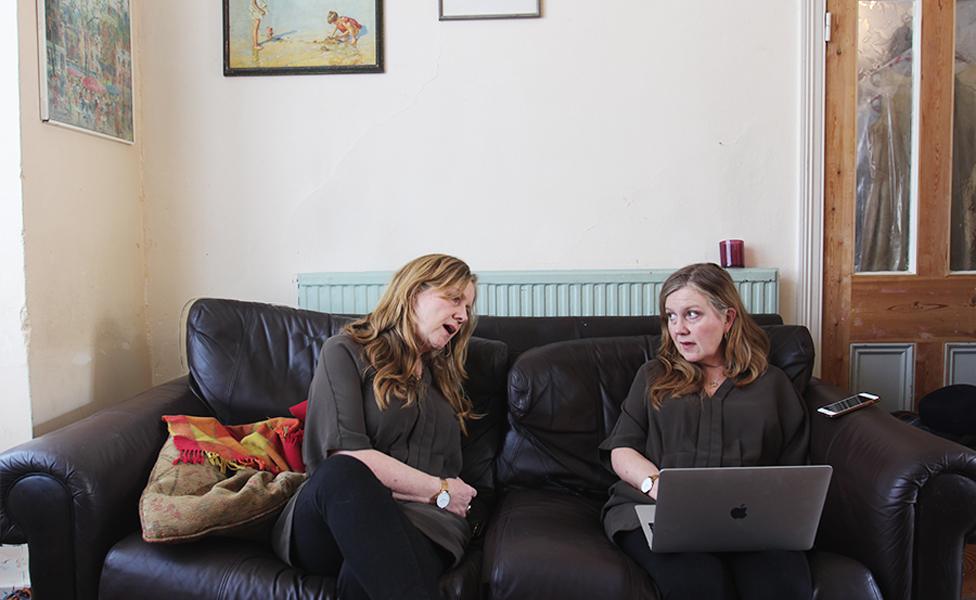
Georgia and Frankie are fairly new to the concept of talking to themselves, but ask any freelancer who spends a lot of time working alone at home, and they'll tell you they're old hands.
Kate Walsh has spoken to herself for as long as she can remember.
"I can get a little bit lonely so I try to be a friend to myself," she says.
Sometimes, she even makes up a tune. "Spring onion, spring onion, I don't like you, but Shaz does, Shaz does..." she'll sing.
I suspect most people who have always worked at home will recognise that straight away.
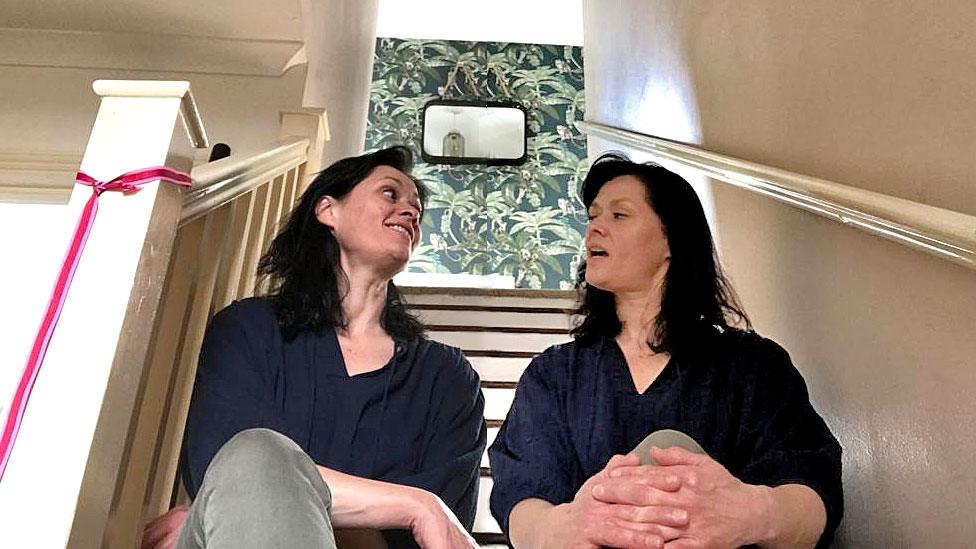
Kate Walsh has spoken to herself for as long as she can remember
"Sometimes I'm not sure if it's happening inside or outside of my head," says Kate.
"Because you spend so much time on your own, your inner dialogue becomes external, so you might say in a shop: 'Why have they only got Marigolds in small?' That kind of thing, little comments, which is fine when you're in your living room but not when you're in Londis talking to the clingfilm."
Kate believes talking to yourself is a really good way of getting through hard times. She found it a useful coping strategy when, a few years ago, after a traffic accident and an MRSA infection, she had to spend three months in a hospital room by herself.
"I'd say out loud: 'This will pass, this isn't that bad.' And just hearing those words helped me through. When you speak out loud you hear the words, whereas if it stays inside your head you don't hear it so well. If it comes out of my mouth it becomes more tangible in my mind."
And now we're stuck indoors, we could all do with a bit of reassurance.
"There's a subtle pervading atmosphere of tension around at the moment," says Kate. "People have to let out steam, it's a legitimate way of exorcising the stress."
I agree. It definitely helps.
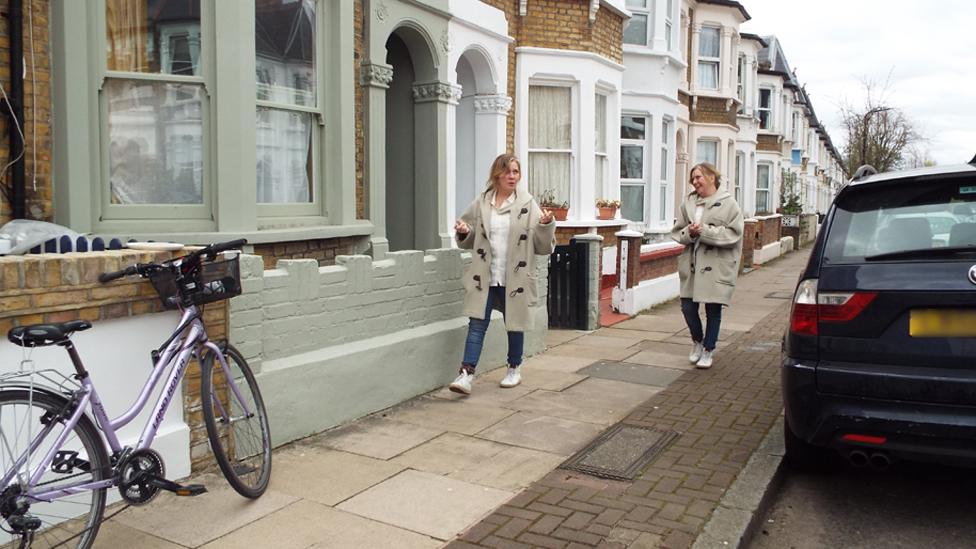
My counsellor once told me to talk to my inner child, and it was good, until my mum died and my friends told me I should talk to her. I ended up talking to both of them - and myself.
There is much talk of how aspects of social distancing might improve life in the future. We may come out of this having got to know our kids better, met previously unknown neighbours on WhatsApp groups, and become fitter on our daily runs.
I think this could also be the perfect opportunity to come out, to boldly chat to ourselves with not a care about who might hear us and what they might think. I think that's a great idea. In fact, I'm going to have a cup of tea and discuss it now, with Sue.
The contributor referred to here as Frankie, who is still embarrassed about talking to herself, asked to be given a pseudonym.
You may also like:
It's becoming normal for grown-up children to spend years at home even after starting work, because of the mismatch between salaries and rents. Sue Elliott-Nicholls and her son, Morgan, agree that it can be a nightmare.
